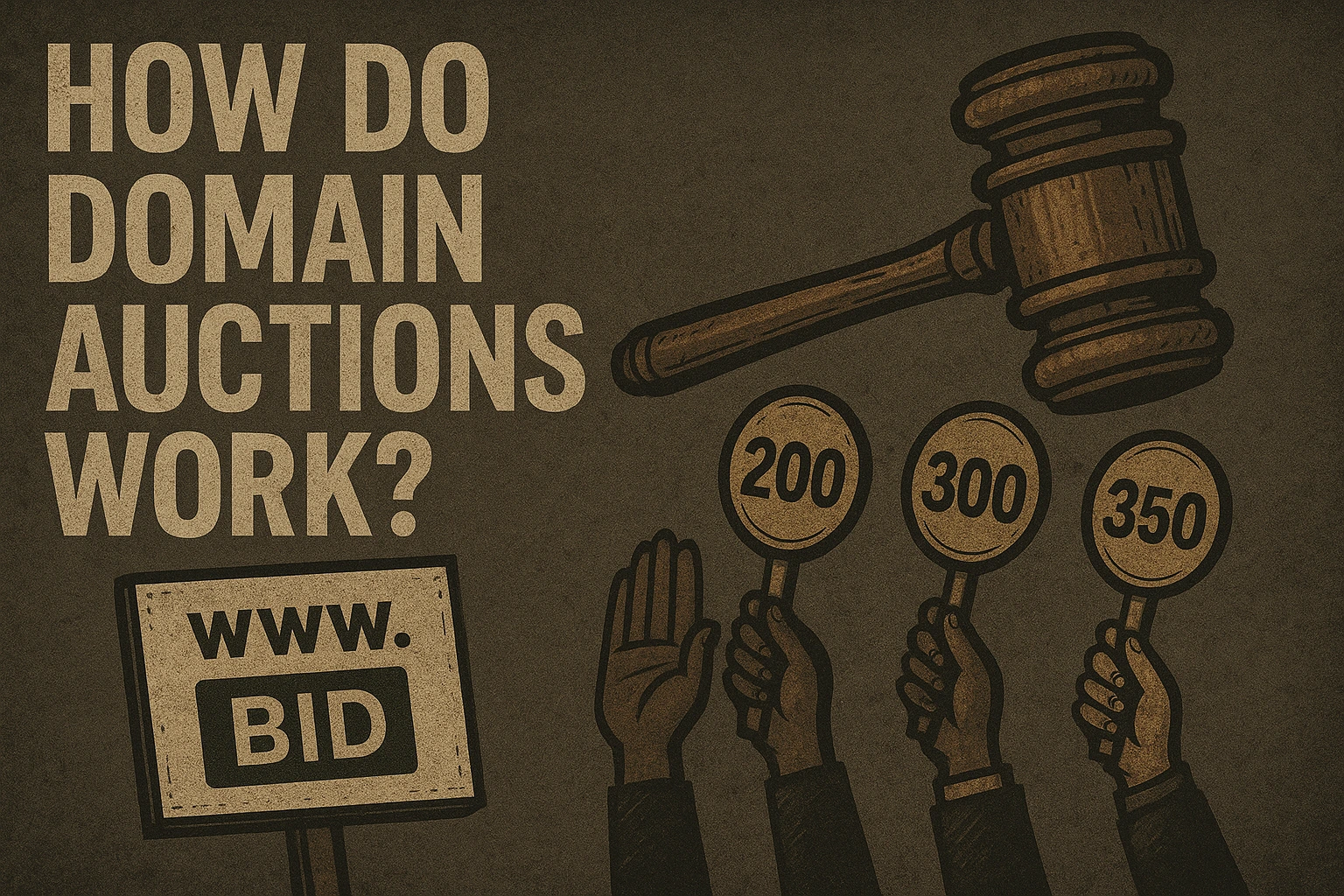If you’re wondering how to find the right domain name that will be critical in developing a strong online presence for you in the fast-paced world of internet commerce, you’ve come to the right place. We know that finding an appropriate domain name can be difficult, especially when the most wanted ones are already taken. That’s where domain auctions come into play.
Individuals and corporations can use domain auctions to buy and sell domain names in a competitive bidding environment. But the auctions come with many complexities in the way they function. Therefore, join us in this post as we untangle the mysteries of domain auctions!
Introduction
Domain names are virtual real estate in today’s digital landscape, expressing a website’s identity and brand. When a domain name expires or becomes available for purchase, it enters the domain auction market, giving prospective purchasers the option to acquire it through a competitive bidding procedure.
Understanding Domain Auctions
Domain auctions are internet marketplaces where people can buy and sell domain names. These auctions are often run by specialist platforms that streamline the entire process and ensure fair and transparent deals. The auction system encourages bidding wars, which can lead to higher prices for desired domain names.
Interested parties place bids on domain names they want to buy during the auction bidding process. Bids are normally made in increments, with the highest bidder holding the current winning position at any given time. Bidders can enter manual bids or use proxy bidding, in which the system automatically raises their bid to keep them in first place until a specified maximum bid is met.
Exploring the Domain Marketplace
Domain marketplaces are platforms for domain auctions. These markets bring domain sellers and potential purchasers together, providing a diverse choice of domain names for bidding. They offer extensive search and filtering tools, allowing purchasers to identify domains that meet their individual needs.
Below are just a few examples of domain marketplace platforms that host domain auctions. Each platform has its own unique features and inventory, so it’s worth exploring multiple options to find the domain name that suits your needs:
- GoDaddy Auctions: GoDaddy is a popular domain registrar that also offers a domain auction platform. It offers a large number of domain names for sale, as well as comprehensive search and filtering tools.
- NameJet: NameJet is a domain auction platform that specializes in expiring and deleting domain names. It is well-known for its large inventory of premium domain names as well as its competitive bidding environment.
- Flippa: Flippa is a well-known online marketplace for buying and selling digital assets, including domain names. It has domain auctions where people can bid on a wide range of domain names from various niches.
- Sedo: Sedo is a leading domain marketplace that offers domain auctions as part of its services. It boasts a vast inventory of domain names and a simple bidding process on its auction site.
- Dynadot: Dynadot is a domain registrar that also offers a domain marketplace with auction functionality. It allows users to list their domain names for auction or participate in bidding on various domain listings.
- SnapNames: SnapNames is a domain auction platform that focuses on expiring and deleting domain names. It provides a large number of domain names for auction as well as advanced search and filtering tools.
- NameCheap Marketplace: NameCheap, a popular domain registrar, has its own domain marketplace that includes domain auctions. Users can browse the available domain listings and submit bids on the domains they like.
- Afternic: Afternic is a domain marketplace owned by GoDaddy. It provides domain auctions, as well as a variety of other services, giving it a complete platform for buying and selling domain names.
Listing and Presentation of Auctions
Sellers submit important details such as the domain name, its history, any associated traffic or revenue, and other pertinent information when offering a domain for auction. Effective presentations that include accurate and interesting descriptions can entice more bidders and raise the likelihood of a successful sale.
Example of domain list presentation on auction:
| Domain Name | Bids/Offers | Price* | Traffic | Age | Enter Bid/Offer | Estimated Value | Time Left | Majestic TF | Majestic CF | Backlinks | Referring Domains |
| exampledomain.com | 5 bids | $500 | High | 3 yrs | $550 | $1,200 | 2 days, 4 hrs | 25 | 30 | 100 | 50 |
| techstartups.net | 3 offers | $250 | Medium | 1 yr | $275 | $500 | 1 day, 6 hrs | 15 | 20 | 50 | 30 |
| topdomains.org | 2 bids | $150 | Low | 2 yrs | $175 | $300 | 3 days, 2 hrs | 10 | 15 | 30 | 20 |
| creativedomain.io | 1 offer | $200 | Low | 4 yrs | $225 | $400 | 6 days, 8 hrs | 20 | 25 | 70 | 40 |
| webdesignpro.co | 4 bids | $400 | High | 5 yrs | $425 | $800 | 1 day, 12 hrs | 35 | 40 | 150 | 80 |
Domain Appraisal and Valuation
Domain assessment is the process of determining the worth of a domain name based on variables such as its length, keyword relevance, brand potential, market demand, and current traffic. Appraisal services and tools assist both buyers and sellers in understanding the future value of a domain, allowing them to make more educated decisions.
The Importance of Auction End Time
Each domain auction has a set end time, after which bidding stops and the highest bidder is proclaimed the winner. The deadline increases the sense of urgency in the bidding process, motivating parties to submit their best bids before the deadline.
Reserve Price and Auction Dynamics
The reserve price is the minimum amount set by the seller to ensure that the domain will not be sold for less than a particular amount. The domain stays unsold if the highest bid does not meet or surpass the reserve price. As the reserve price is reached, the dynamics of an auction might shift radically, with bidders boosting their efforts to secure the domain.
Smooth Domain Transfer Process
The domain transfer process begins when the auction closes. It entails transferring ownership from the seller to the buyer. Domain registrars play an important role in supporting this procedure and guaranteeing a smooth and secure domain name transfer.
Proxy Bidding and its Benefits
In domain auctions, proxy bidding is a popular feature. It enables bidders to select a maximum bid amount, allowing the system to automatically increase their price progressively in order to maintain the top position. Proxy bidding removes the need for frequent manual bidding and allows bidders to actively engage in auctions without having to be present at all times.
Auction Fees and Financial Considerations
Domain auctions frequently contain fees, such as listing fees for sellers and auction site commission fees. To secure a reasonable return on investment, sellers should consider these financial elements when choosing their asking price.
The Role of Domain Registrars
What is a domain name registrar? Domain registrars are approved entities in charge of domain name management. They offer domain registration services, keep domain records, and help with domain ownership transfers. Choosing a trustworthy registrar is critical for a safe and trouble-free domain auction experience.
Domain Flipping and Investment Opportunities
Domain flipping is the process of purchasing domain names at a lower cost and later selling them for a profit. Domain auctions are a wonderful way for investors and businesses to uncover discounted domain names and capitalize on their future selling possibilities.
Strategies for Success in Domain Auctions
Participants in domain auctions must apply smart methods in order to succeed. Thorough pre-auction research, focused bidding, understanding market trends, and considering the risks and benefits connected with each area are examples of these.
Pre-Auction Research and Due Diligence
To make informed selections, substantial pre-auction research is required. It includes investigating the domain’s history, traffic figures, search engine rankings, as well as any potential legal or trademark issues. Thorough due diligence reduces risks and raises the likelihood of acquiring valuable domains.
Auction House Policies and Regulations
Participants must follow the policies and regulations of each domain auction platform. It is critical to become acquainted with these rules in order to ensure a fair and compliant bidding procedure.
In the End
After reading, you should be now well-equipped to grasp the complexities of domain auctions and handle the process with confidence, increasing your chances of getting an appropriate domain name for your online ventures. Good luck!
Don’t want to waste time and effort building your PBN from scratch?
Looking to increase the organic traffic to your website and its search engine rankings? Look nowhere else! Join forces with a seasoned provider of PBN services to experience the power of pre-built PBN linkages. Our team of professionals has carefully constructed a private blog network (PBN) made up of top-notch, reliable websites in numerous genres. You can easily improve your website’s SEO performance and take control of the search engine results pages with the help of our pre-made PBN links. Get immediate access to a network of potent backlinks that are carefully crafted to dramatically increase the authority and exposure of your website.
Don’t waste time and effort building your PBN from scratch – trust the professionals and unlock the potential of your online presence with our top-notch PBN service. Boost your rankings, increase organic traffic, and watch your business thrive. Buy PBN links today and take your SEO strategy to new heights!
FAQs
1. What are domain auctions?
Domain auctions are online platforms where individuals and businesses buy and sell domain names through competitive bidding.
2. How does the auction bidding process work?
Interested buyers place bids on domain names, with the highest bid at any given time holding the winning position. Proxy bidding allows automated bidding on behalf of participants.
3. What is the role of domain registrars in domain auctions?
Domain registrars facilitate the transfer of ownership from the seller to the buyer after the auction concludes, ensuring a smooth and secure process.
4. What is domain flipping?
Domain flipping refers to buying domain names at a lower price and selling them later for a profit, leveraging their potential value.
5. How can I succeed in domain auctions?
Success in domain auctions can be achieved through thorough pre-auction research, targeted bidding, understanding market trends, and assessing the potential risks and rewards associated with each domain.

Irene Sloan is a blockchain analyst, tech writer, and founder of the Lenincoin blog. With a background in economics and a passion for decentralization, she simplifies complex crypto topics for everyday readers. Irene specializes in breaking down mining, NFTs, DeFi, and altcoins into practical guides, always staying ahead of trends in the Web3 space. When she’s not researching the next big crypto shift, she’s likely exploring open-source projects or attending blockchain meetups across Europe.

